The Smart Rings Market is estimated to be valued at USD 0.3 billion in 2025 and is projected to reach USD 2.8 billion by 2035, registering a compound annual growth rate (CAGR) of 24.1% over the forecast period. Supported by an exceptional CAGR of 24.1%, this rapid growth is driven by increasing adoption of wearable technology, particularly for health tracking, mobile payments, and personal security.
During the first five years (2025 to 2030), the market will expand from USD 0.3 billion to USD 1.0 billion, adding USD 0.7 billion, which accounts for 28% of the total incremental growth, with a 5-year multiplier of 3.33x. The second phase (2030–2035) contributes USD 1.8 billion, representing 72% of incremental growth, reflecting accelerating momentum as consumer demand for multifunctional smart rings increases in both mainstream and niche markets.
Annual increments rise from USD 0.2 billion in early years to USD 0.5 billion by 2035, signaling stronger growth driven by advancements in smart ring technology, integration with IoT, and expanding applications in health monitoring and personal safety. Manufacturers focusing on enhancing functionality, aesthetics, and user comfort will capture the largest share of this USD 2.5 billion opportunity.
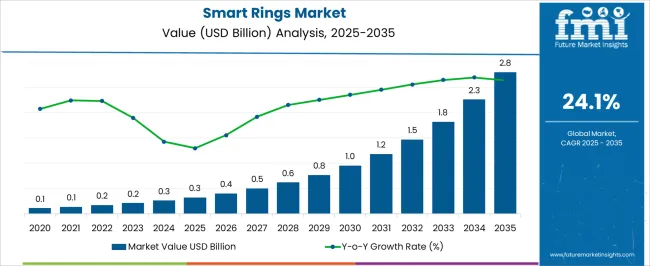
| Metric | Value |
|---|---|
| Smart Rings Market Estimated Value in (2025 E) | USD 0.3 billion |
| Smart Rings Market Forecast Value in (2035 F) | USD 2.8 billion |
| Forecast CAGR (2025 to 2035) | 24.1% |
The smart rings market is growing rapidly as wearable technology becomes more integrated into daily life and health monitoring. Increasing smartphone penetration, especially Android devices, has played a major role in driving the adoption of smart rings, which rely on seamless compatibility for full functionality.
Bluetooth technology dominates as the preferred connectivity option, offering low power consumption and reliable data transmission. Consumers are seeking discreet and convenient devices to track fitness, sleep, and notifications without bulky wearables.
This trend has expanded the user base, with men making up a significant portion of the market due to preferences for stylish and functional accessories. Continued product innovation, improved sensor accuracy, and the growing focus on health awareness are expected to fuel future growth. Expanding applications beyond fitness to include contactless payments and security features are also enhancing market prospects. Segment growth is expected to be led by Android-compatible smart rings using Bluetooth technology and targeting male consumers.
The smart rings market is segmented by operating system, technology, consumer group, price range, distribution channel, and geographic regions. By operating system, the smart rings market is divided into Android and iOS. In terms of technology, the smart rings market is classified into Bluetooth and NFC. The consumer group of the smart rings market is segmented into Men, Women, and Unisex. The smart rings market is segmented by price range into Medium ($50 - $200), Low ($50), and High (> $200). By distribution channel, the smart rings market is segmented into Online Channels and Offline Channels. Regionally, the smart rings industry is classified into North America, Latin America, Western Europe, Eastern Europe, Balkan & Baltic Countries, Russia & Belarus, Central Asia, East Asia, South Asia & Pacific, and the Middle East & Africa.
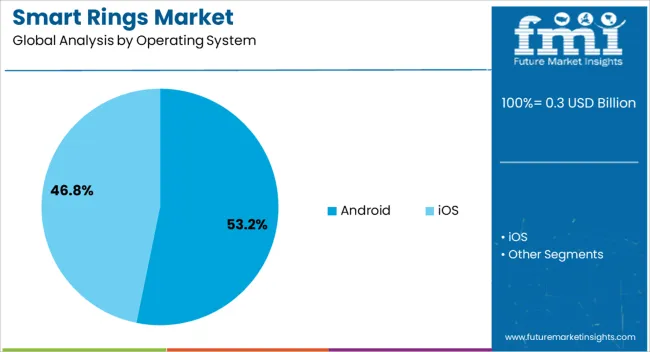
The Android segment is projected to account for 53.2% of the smart rings market revenue in 2025, retaining its position as the leading operating system. This dominance is due to the widespread use of Android smartphones globally, which facilitates compatibility and seamless integration of smart ring functionalities.
Manufacturers have optimized their devices to support the wide variety of Android versions and hardware, ensuring a broad user base. Additionally, Android's open ecosystem encourages app development and customization, enhancing the user experience and feature sets available through smart rings.
The affordability and diverse device options in the Android market have also helped expand adoption. With Android continuing to dominate smartphone shipments worldwide, the smart rings compatible with this OS are expected to maintain their leading market share.
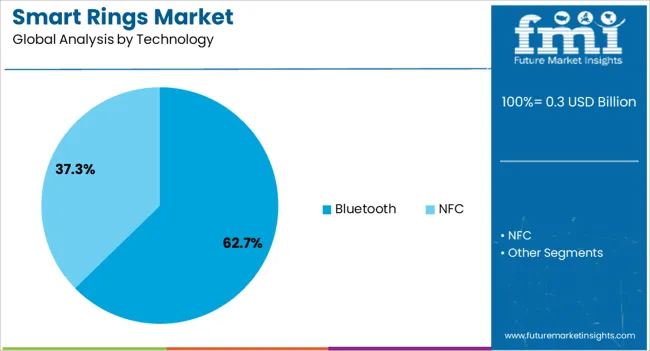
The Bluetooth technology segment is expected to hold 62.7% of the smart rings market revenue in 2025, making it the most widely used connectivity technology. Bluetooth's low energy consumption and reliable short-range communication make it ideal for wearable devices like smart rings.
Its compatibility with both Android and iOS devices has made it the default standard for data syncing and notifications. Advances in Bluetooth protocols have improved data transfer speeds and security, addressing earlier limitations.
The ability to connect with smartphones, fitness trackers, and other smart devices seamlessly has made Bluetooth indispensable. As consumers demand continuous real-time monitoring and convenience, Bluetooth-enabled smart rings are expected to dominate the market.
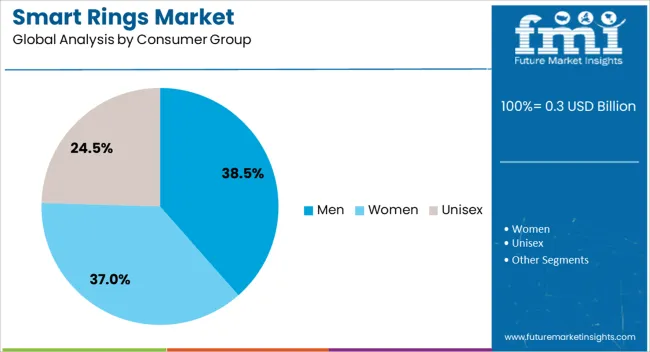
The Men segment is projected to contribute 38.5% of the smart rings market revenue in 2025, holding a significant share of the consumer base. This growth has been driven by men's growing interest in wearable tech that combines functionality with style.
Smart rings appeal to men looking for compact devices that offer health tracking, notifications, and lifestyle management without compromising on aesthetics. Marketing campaigns and product designs have increasingly targeted male consumers with sleek, masculine designs and features that align with active lifestyles.
Social trends promoting health consciousness and technology adoption among men have also boosted market penetration. As product offerings diversify and consumer awareness grows, the men’s segment is expected to sustain its strong position within the smart rings market.
The smart rings market is driven by rising demand for wearable technology and increasing interest in health and fitness applications. Opportunities in health monitoring and the growing trend of IoT and mobile payment integration are shaping the market. However, high prices and limited awareness may hinder broader adoption. By 2025, addressing these challenges through affordable solutions and improved consumer education will be essential for continued market growth.
The smart rings market is expanding due to the rising demand for wearable technology and smart devices. Smart rings, known for their compact size and multifunctionality, offer convenience and seamless integration with smartphones and other connected devices. The need for discreet, portable solutions that offer health tracking, notifications, and payment capabilities is driving the market. By 2025, this demand for wearable, easy-to-use technology will continue growing, particularly in health, fitness, and lifestyle applications.
Opportunities in the smart rings market are growing with the increasing adoption of health monitoring and fitness applications. Smart rings provide users with the ability to track vital metrics such as heart rate, sleep patterns, and physical activity. This makes them popular among health-conscious consumers and fitness enthusiasts. By 2025, the demand for smart rings in health monitoring will continue to rise, as more individuals seek advanced wearable solutions to enhance their wellness routines.
Emerging trends in the smart rings market include the growing integration of mobile payment solutions and the Internet of Things (IoT). Smart rings are increasingly being used for contactless payments, offering convenience and security. Additionally, their ability to connect with other IoT devices, such as home automation systems, is creating new growth opportunities. By 2025, these trends are expected to play a significant role in expanding the market, as consumers seek more connected and multifunctional wearable devices.
Despite growth, challenges related to high prices and limited consumer awareness persist in the smart rings market. The cost of advanced smart rings, especially those with specialized features, can be prohibitive for many consumers. Additionally, while the technology has gained traction in niche markets, broader awareness and understanding of the product remain limited. By 2025, overcoming these challenges through affordable pricing and improved marketing will be crucial for expanding market adoption.
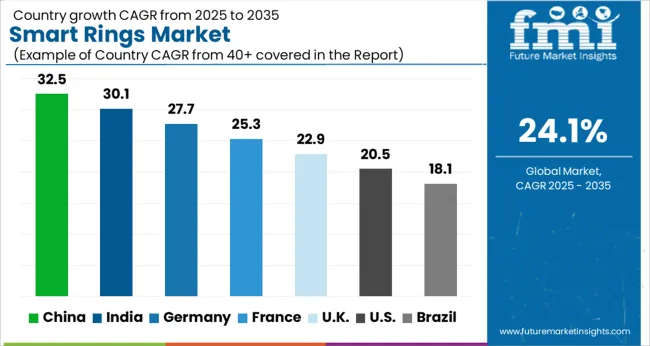
The global smart rings market is projected to grow at a 24.1% CAGR from 2025 to 2035. China leads with a growth rate of 32.5%, followed by India at 30.1%, and France at 25.3%. The United Kingdom records a growth rate of 22.9%, while the United States shows the slowest growth at 20.5%. These varying growth rates are driven by factors such as increasing consumer demand for wearable technologies, the growing trend of health monitoring, and advancements in personal electronics.
Emerging markets like China and India are experiencing higher growth due to rising disposable incomes, increasing tech adoption, and the demand for innovative consumer products, while more mature markets like the USA and the UK see steady growth driven by technological advancements, health and fitness trends, and a shift towards wearable devices. This report includes insights on 40+ countries; the top markets are shown here for reference.
The smart rings market in China is growing rapidly, with a projected CAGR of 32.5%. China’s burgeoning wearable tech market, fueled by rising consumer interest in health and fitness monitoring, is a key driver of demand for smart rings. The country’s growing middle class, increasing disposable incomes, and rapid adoption of advanced consumer electronics are significantly contributing to market growth. Additionally, China’s focus on integrating technology into daily life, along with the rising popularity of health-conscious lifestyles, continues to accelerate the demand for smart rings as convenient, multifunctional wearable devices.
The smart rings market in India is projected to grow at a CAGR of 30.1%. India’s growing demand for wearable technologies, particularly for health and fitness monitoring, is driving the rapid adoption of smart rings. The country’s expanding middle class, increasing disposable income, and rising interest in personal wellness are contributing to the market’s growth. Additionally, the growing popularity of fitness trackers, the increasing awareness of wellness, and the shift toward personalized health management further fuel the demand for smart rings in the Indian market.
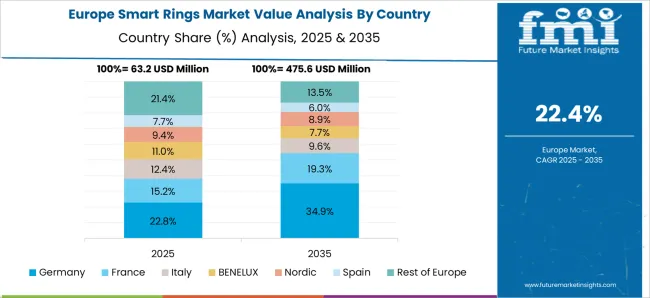
The smart rings market in France is projected to grow at a CAGR of 25.3%. France’s increasing adoption of wearable technology, particularly in health and fitness monitoring, is contributing to steady growth in the smart rings market. The country’s growing consumer interest in health and wellness, coupled with a shift towards convenience and wearable devices, is driving demand. Additionally, France’s emphasis on technology innovation and the rising popularity of multifunctional gadgets is boosting the market for smart rings, particularly in urban areas with tech-savvy consumers.
The smart rings market in the United Kingdom is projected to grow at a CAGR of 22.9%. The UK’s growing interest in health and fitness technology, alongside the increasing popularity of wearable devices, is driving steady market demand. The adoption of smart rings, particularly in the health-conscious consumer segment, continues to rise as people seek advanced solutions for fitness tracking and wellness management. Additionally, the UK’s emphasis on innovation and the growth of the IoT ecosystem further contribute to the market’s expansion, with smart rings gaining popularity in health and lifestyle applications.
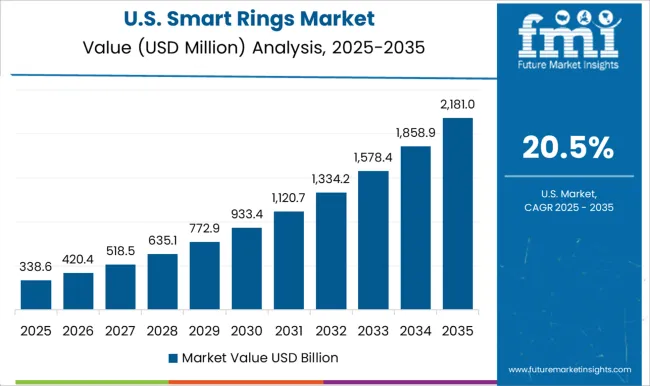
The smart rings market in the United States is expected to grow at a CAGR of 20.5%. The USA market remains strong, driven by the growing interest in wearable health and fitness technologies. The increasing adoption of wearable devices for fitness tracking, health monitoring, and lifestyle management continues to drive the demand for smart rings. Additionally, the USA focus on health and wellness, coupled with advancements in wearable technology and IoT connectivity, supports steady market growth, particularly among tech-savvy and health-conscious consumers.
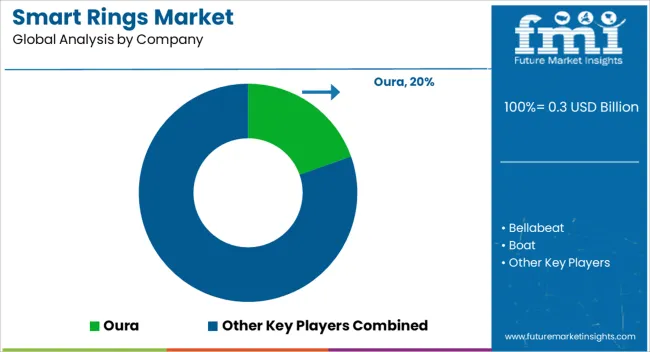
Teledyne FLIR, through its Endeavor Robotics unit, positions itself as a leader by combining thermal imaging, autonomous navigation, and proven battlefield reliability, ensuring its platforms are trusted for reconnaissance and bomb disposal tasks. QinetiQ applies its broad defense expertise to deliver adaptable systems optimized for situational awareness and troop protection, focusing on flexibility in payload and control systems. Ghost Robotics has created a distinct niche with legged robotic platforms that offer unprecedented mobility and agility in harsh or unpredictable terrain, expanding operational reach where wheeled or tracked robots may falter.
Roboteam and Recon Robotics concentrate on compact and modular architectures, providing operators with lightweight robots capable of integrating sensors, cameras, and communications modules for urban and tactical scenarios. Northrop Grumman uses its extensive defense portfolio to embed micro robots into wider unmanned and networked systems, aligning ground robots with aerial and naval platforms for unified command and control. Boston Dynamics and Sarcos Robotics contribute cutting-edge locomotion, dexterity, and human-machine interface technologies, which, while not always designed exclusively for tactical robots, are increasingly adapted to enhance mobility and operator usability. Milrem Robotics focuses on hybrid unmanned ground vehicle solutions that bridge micro tactical functions with larger autonomous platforms, providing versatility for both reconnaissance and heavy-duty missions. The competitive dynamic across these companies is centered on improving autonomy to reduce operator burden, advancing ruggedization for deployment in extreme conditions, ensuring payload versatility for multi-mission capability, and strengthening secure communications to resist cyber threats.
| Item | Value |
|---|---|
| Quantitative Units | USD 0.3 Billion |
| Operating System | Android and iOS |
| Technology | Bluetooth and NFC |
| Consumer Group | Men, Women, and Unisex |
| Price Range | Medium ($50 - $200), Low ($50), and High (>$200) |
| Distribution Channel | Online Channels and Offline Channels |
| Regions Covered | North America, Europe, Asia-Pacific, Latin America, Middle East & Africa |
| Country Covered | United States, Canada, Germany, France, United Kingdom, China, Japan, India, Brazil, South Africa |
| Key Companies Profiled | Oura, Bellabeat, Boat, Circular Ring, Fujitsu, Kerv Wearables, Log bar, McLear Ltd., Moodmetric, Moen Smart Ring, Noise, Sky Labs, Sleepon Ring, and Ultrahuman |
| Additional Attributes | Dollar sales by ring type and application, demand dynamics across health, fitness, and fashion sectors, regional trends in smart ring adoption, innovation in biometric sensing and connectivity technologies, impact of regulatory standards on data security and privacy, and emerging use cases in wearable healthcare devices and smart home integration. |
The global smart rings market is estimated to be valued at USD 0.3 billion in 2025.
The market size for the smart rings market is projected to reach USD 2.8 billion by 2035.
The smart rings market is expected to grow at a 24.1% CAGR between 2025 and 2035.
The key product types in smart rings market are android and ios.
In terms of technology, bluetooth segment to command 62.7% share in the smart rings market in 2025.






Our Research Products

The "Full Research Suite" delivers actionable market intel, deep dives on markets or technologies, so clients act faster, cut risk, and unlock growth.

The Leaderboard benchmarks and ranks top vendors, classifying them as Established Leaders, Leading Challengers, or Disruptors & Challengers.

Locates where complements amplify value and substitutes erode it, forecasting net impact by horizon

We deliver granular, decision-grade intel: market sizing, 5-year forecasts, pricing, adoption, usage, revenue, and operational KPIs—plus competitor tracking, regulation, and value chains—across 60 countries broadly.

Spot the shifts before they hit your P&L. We track inflection points, adoption curves, pricing moves, and ecosystem plays to show where demand is heading, why it is changing, and what to do next across high-growth markets and disruptive tech

Real-time reads of user behavior. We track shifting priorities, perceptions of today’s and next-gen services, and provider experience, then pace how fast tech moves from trial to adoption, blending buyer, consumer, and channel inputs with social signals (#WhySwitch, #UX).

Partner with our analyst team to build a custom report designed around your business priorities. From analysing market trends to assessing competitors or crafting bespoke datasets, we tailor insights to your needs.
Supplier Intelligence
Discovery & Profiling
Capacity & Footprint
Performance & Risk
Compliance & Governance
Commercial Readiness
Who Supplies Whom
Scorecards & Shortlists
Playbooks & Docs
Category Intelligence
Definition & Scope
Demand & Use Cases
Cost Drivers
Market Structure
Supply Chain Map
Trade & Policy
Operating Norms
Deliverables
Buyer Intelligence
Account Basics
Spend & Scope
Procurement Model
Vendor Requirements
Terms & Policies
Entry Strategy
Pain Points & Triggers
Outputs
Pricing Analysis
Benchmarks
Trends
Should-Cost
Indexation
Landed Cost
Commercial Terms
Deliverables
Brand Analysis
Positioning & Value Prop
Share & Presence
Customer Evidence
Go-to-Market
Digital & Reputation
Compliance & Trust
KPIs & Gaps
Outputs
Full Research Suite comprises of:
Market outlook & trends analysis
Interviews & case studies
Strategic recommendations
Vendor profiles & capabilities analysis
5-year forecasts
8 regions and 60+ country-level data splits
Market segment data splits
12 months of continuous data updates
DELIVERED AS:
PDF EXCEL ONLINE
Smart Meeting Pod Market Size and Share Forecast Outlook 2025 to 2035
Smart Electrogastrogram Recorder Market Size and Share Forecast Outlook 2025 to 2035
Smart Aerial Work Robots Market Size and Share Forecast Outlook 2025 to 2035
Smart Bladder Scanner Market Size and Share Forecast Outlook 2025 to 2035
Smart School Bus Platform Market Size and Share Forecast Outlook 2025 to 2035
Smart Home Wireless Smoke Detector Market Size and Share Forecast Outlook 2025 to 2035
Smart Bus Platform Market Size and Share Forecast Outlook 2025 to 2035
Smart Vision Processing Chips Market Size and Share Forecast Outlook 2025 to 2035
Smart Touch Screen Scale Market Size and Share Forecast Outlook 2025 to 2035
Smart Magnetic Drive Conveyor System Market Size and Share Forecast Outlook 2025 to 2035
Smart Wheelchair market Size and Share Forecast Outlook 2025 to 2035
Smart Mining Technologies Market Size and Share Forecast Outlook 2025 to 2035
Smart Parking Market Size and Share Forecast Outlook 2025 to 2035
Smart Digital Valve Positioner Market Forecast and Outlook 2025 to 2035
Smart Card IC Market Size and Share Forecast Outlook 2025 to 2035
Smart-Tag Inlay Inserters Market Analysis - Size and Share Forecast Outlook 2025 to 2035
Smart TV Market Forecast and Outlook 2025 to 2035
Smart/AI Toy Market Size and Share Forecast Outlook 2025 to 2035
Smart Locks Market Size and Share Forecast Outlook 2025 to 2035
Smart Sprinkler Controller Market Size and Share Forecast Outlook 2025 to 2035

Thank you!
You will receive an email from our Business Development Manager. Please be sure to check your SPAM/JUNK folder too.
Chat With
MaRIA